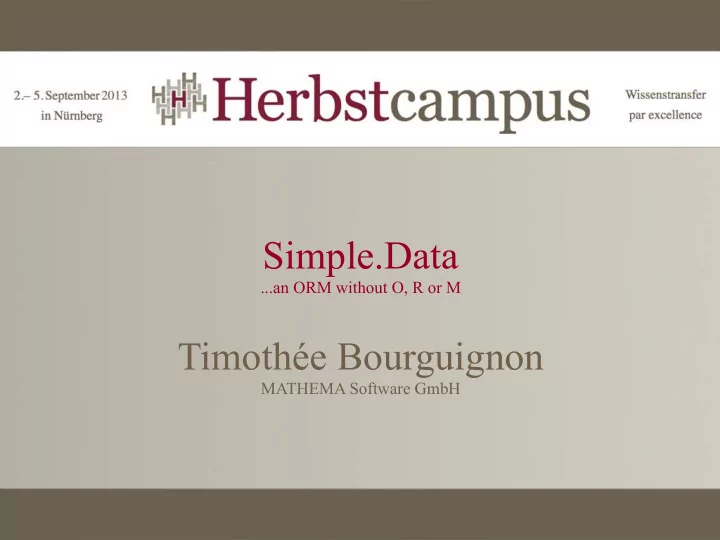

Simple.Data ...an ORM without O, R or M Timothée Bourguignon MATHEMA Software GmbH
Simple.Data … an ORM without O, R or M Timothée Bourguignon 1
What is Simple.Data? An O/RM without O, R or M! 3
Hands-on! • SQL Server + MvcMusicStore DB – http://mvcmusicstore.codeplex.com/ 4
What is Simple.Data? • Lightweight way of manipulating data – Based on .NET 4.0's „dynamic“ keyword – Interprets method and property names – Maps them to your underlying data-store – Prevents SQL Injection – Inspired by Ruby’s ActiveRecord and DataMappers – Open Source & runs on Mono – V1.0 rc3 released in Nov. 2012 5
The Menu • Generalities • Conventions • Hands-ons • CRUD Operations along the • Objects Returned way • Joins & Evaluation Strategies • Various Functions • Tool & Testing • Wrap-Up 6
Database agnostic 7
Package Architecture Core MongoDB OData Azure Ado SqlServer SqlCompact40 Oracle VistaDB MySQL SQLite PostgreSQL SQLAnywhere Informix Mocking 9
Nuget Packages PM> Install-Package Simple.Data.SqlServer Simple.Data.Ado Simple.Data.SqlCompact40 Simple.Data.Sqlite Simple.Data.MongoDB ... 10
Conventions 11
Opening a Connection var magicDb = Database .OpenConnection("ConnectString"); var fileDb = Database .OpenConnection("MyDB.sdf"); • Per default connections are aggressively opened and closed for each query • Supports shared connections 12
Choose your weapon • The „Fluid“ Way – Methods & properties convention-based mapping • The „Indexer“ Way – Identification via an indexer syntax 13
The Fluid Way db.album.FindAllByGenreId(3); Parameters Column Command Table/View 14
The Indexer Way • The problem //Find by „Candy“ or find by „C and Y“? db.sweets.FindAllByCAndY("Oreo"); • The solution //Full indexer way db["sweets"].FindAllBy(Candy: "Oreo"); //Hybrid fluid + indexer db.sweets.FindAllBy(Candy: "Oreo"); db["city"].FindAllByCityName("Paris"); 15
Target Matching • Sequence – Exact match – Case-insensitive - non-alphanumeric chars – Pluralized/Singularized version • The following are thus all identical – Albums.GenreId – [ALBUM].[GENREID] – Album.GenreId – AlBuM.geNReId – ALBUMS.GENREID – Al__*bum.Genr-eId – ALBUM.GENREID – ... – [ALBUMS].[GENREID] 16
No IntelliSence • Dynamics => no member / function inferrence • Schema analyse planned for Simple.Data v2 • Tool: Simple.Data.Pad • Still easy to get used to 17
CRUD OPERATIONS 18
Create • Insert(object or named parameters) 19
Read • Read – All() – Find(simple expressions) – Get(primary key) – FindAll(optional condition) – FindAllByXXX(parameter) 20
Update • Update(object or named parameters) – Update – UpdateByXXX – UpdateAll + optional condition • Upsert e.g. Update or Insert • Some kind of optimistic locking – Update(modifiedObject, originalObject) – Fails if the column(s) you are modifying changed • Nota: does not work with Upsert 21
Delete • Delete – Delete(object or named parameters) – DeleteByXXX(parameters) – DeleteAll(optional conditions) 22
Hands-on! • CRUD Operations – Insert – Update – Delete – Read 23
Objects Returned 24
SimpleRecord • Dynamic object • Contains a property for each of the columns requested whose values are those of the single row retrieved from the data store • „Cast-able“ to a concrete implementation 25
SimpleQuery • Dynamic object • Similar to LINQ structure • Executes when enumerated • Contains a SimpleRecord object for each row returned 26
Casting • Casting to objects – Implicit – Explicit: Cast<T>, ToList, ToList<T>, ToArray, ToArray<T> • Hands-On – Implicit casting – Explicit casting 27
Joins & Evaluation Strategies 28
Hands-on! • Lazy natural evaluation • Casting + Lazy? • Eager evaluation 29
Joins • Lazy loading – Natural Joins / Table chaining • Eager Loading – „With Joins“ • With/WithXXX Foreign-Key relationship present • WithOne No Foreign-Key relationship necessary • WithMany (no referential integrity) – „Explicit Joins“ • Join Natural joins can be used as part of an explicit • LeftJoin join, the join is then eager loaded • OuterJoin 30
Hands-on! • Eager Joins – Select + Natural Joins + As – With 31
Various Functions 32
Ordering Results • OrderBy, OrderByDescending • ThenBy, ThenByDescending db.Albums.All().OrderByGenreId() .ThenByArtistIdDescending(); 33
Scalar Queries • GetCount • GetCountBy • Exists, Any • ExistsBy, AnyBy int albumCount = db.Albums.GetCount( db.Albums.GenreId == 2); 34
Query Modifiers • Select – Star & AllColumns db.Albums.All().Select(db.Albums.Title, db.Albums.ArtistId); 35
Query Modifiers • Column Aliasing: As(string) var albums = db.Albums.All().Select( db.Albums.AlbumId, db.Albums.Title.As("AlbumName")); 36
Query Modifiers • Where clauses – Operators (+, -, *, /, %) – IN, BETWEEN, LIKE, IS NULL var albums = db.Albums.FindAllByGenreId(1) .Select(db.Albums.Title) .Where(db.Albums.Price < 8); db.Albums.All().Where( db.Albums.Title.Like("%Side Of The%")); 37
Aggregate Functions • Grouping and Aggregates – Having → Group By / Having – Min, Max, Avg, Sum var cheapAlbums = db.Albums.All() .Having(db.Albums.Price < 9).ToList(); var totalCost = db.Albums.All().Select( db.Albums.Price.Sum().As("TotalCost")); 38
Stored Procedures • Like a function... CREATE PROCEDURE ProcedureWithParameters @One VARCHAR(MAX), @Two VARCHAR(MAX) AS SELECT * FROM Customers WHERE Firstname = @One and Lastname like @Two db.ProcedureWithParameters(1, 2); 39
Transactions • Wrap up the calls using (var transaction = db.BeginTransaction()) { transaction.albums.Insert(GenreId: 1...); transaction.Commit(); } 40
Tool & Testing 41
Tool: Simple.Data.Pad • Similar to LINQ-Pad... kind of... – https://github.com/markrendle/Simple.Data.Pad 42
Testing: InMemoryAdapter [Test] public void Should_do_something() { var adapter = new InMemoryAdapter(); Database.UseMockAdapter(adapter); var db = Database.Open(); db.Test.Insert(Id: 1, Name: "Alice"); //... } • The InMemoryAdapter supports – Joins, Transactions, Stored procedures... 43
InMemoryAdapter Configuration • Tweaking functions – SetKeyColumn – SetAutoIncrementColumn – AddFunction (stored procedure) – ConfigureJoin – ... 44
Design 45
Wrap-Up 46
Wrap-up • OpenSource, Mono • Joins, lazy, eager • Everything is – Natural, WithXXX, dynamic Join • Various Functions • Fluid-, Indexer Way – Group, Order, Scalar, • CRUD Modifiers etc. – FindXXX, DeleteXXX, • Tool & Testing UpdateXXX etc. • Design • Dynamics Objects Returned 47
Simple.Data in Short • Lightweight • Dynamics extensive • Readable testing • Compelling • Good understanding • Fun to use upfront • Interesing design • My Recommendation – Try it and study it – Take it for a spin for some tooling and/or prototyping – ...and some projects? 48
Further Reading • Github – https://github.com/markrendle/Simple.Data • Nuget – http://nuget.org/packages?q=simple.data • GoogleGroup – https://groups.google.com/forum/?fromgroups#! forum/simpledata • Mark Rendle – @MarkRendle – http://blog.markrendle.net/ 49
Ich freue mich auf Eure Fragen! tim.bourguignon@mathema.de about.me/timbourguignon 50
Recommend
More recommend